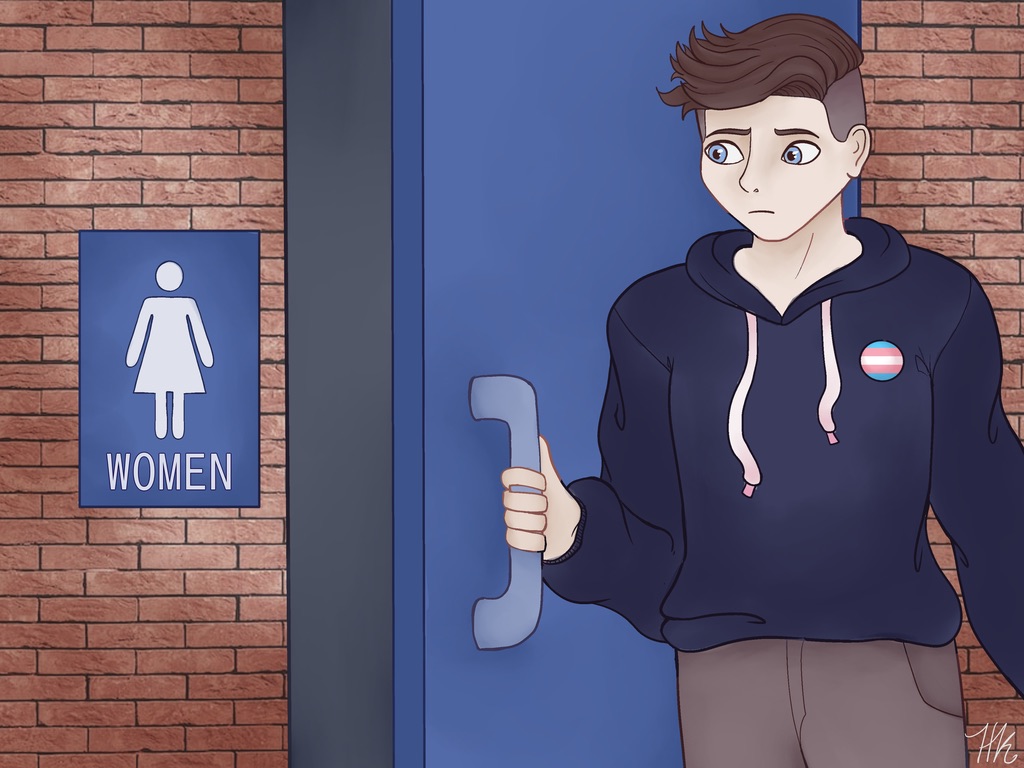When sophomore Avery Mohr read up on the new state policies, he said “inconvenient” was the first word to come to mind. Florida legislators passed more than 200 laws that were enacted on July 1, 18 of which were education laws. Mohr, a transgender student, said the creation of nickname forms and the extensions of House Bill 1069 and 1521 were unnecessary and targeted the transgender community.
“I’m not surprised there’s new legislation, but I could not have predicted the extent of it,” he said. “The intentions were [good], but there are better ways to enforce them. I can see how it would marginalize [transgender] people.”
Justin Cercone, the president of Space Coast Pride, said the legislation creates social divides and harms the LGBTQ community. He said he has noticed fear levels skyrocket among people attending pride events. Especially among performers such as drag queens.
“[The new legislation] is building more walls and creating more hate, and we’re seeing that in the number of attacks on trans people,” he said. “Throughout our country, the number of trans people who are attacked and killed every year is increasing significantly, and creating laws like this is influencing hate on some level because it shows them [as] different, when everyone is the same.”
With the new form policy, every student who wants to be called a name that isn’t on their birth certificate must have a parent signature stating that their preferred name is acceptable. The state prohibits teachers from using a student’s preferred name until the nickname form is completed. In early August, the state legislature created the nickname forms. Because of the short-term notice, Principal Rick Fleming said he’s concerned about abiding by the law “with fidelity and totality.”
“Nowadays, they enact legislation in February to May,” he said. “They expect us to implement it in August, and it’s very difficult to go through thousands of pages of legislative changes.”
Fleming expressed concerns about the lack of efficiency with paperwork, highlighting that the policy would be easier to enforce during registration than on Aug. 18, when the forms were distributed. He said that the nickname form policy was created for students using names resembling a gender that does not match their birth certificate.
“I can understand if a child is struggling with sexual identity and they want to be called a different name by a different gender,” Fleming said. “Not to ‘out’ anybody, but I think parents need to know that their child is considering [identifying as another gender], unless [the student is] in danger [after coming out].”
Senior Rosalina Rodriguez, a transgender student, said the nickname policy alienates the transgender community, contributing to her choice to take online classes at Eastern Florida State College.
“I know that none of my teachers or my peers would be rude to me about [my name or pronouns] or treat me differently because I’m trans,” she said. “I also didn’t want to have to put them in an awkward situation, especially with some of my teachers that are very big rule followers. I don’t blame them at all for following the law, even though it is unjust.”
Mohr said although the form system is time-consuming and wasteful, parents should know about their children’s lives in school.
“I think [the nickname forms] could be done on an interpersonal level instead of a legal level, make it more of a communication thing,” he said. “The school should reach out to the parents and ask if they want to know what their kid is learning about [and name he or she is using].”
Florida legislators extended House Bill 1069, known by its critics as the ‘Don’t Say Gay’ bill, to prohibit staff members from asking about, using, or discussing preferred pronouns that do not resemble a students’ biological sex.
Since Rodriguez turned in the nickname form, she said there’s a social disconnect if faculty members call her ‘Rosalina’ but aren’t allowed to use she/her pronouns.
“We should focus on keeping our schools as welcoming as possible,” Rodriguez said. “If one of my teachers is fired or seriously in trouble over calling me by my name [or pronouns], I don’t know how I would even process that—that’s beyond ridiculous to me.”
AP Literature and Capstone Research teacher Lynne Bramlett said she avoids using pronouns and calls students by their names instead. She said she finds the legislation to curtail the rights of transgender students.
“I think it’s the death of common sense for parents to raise their children so they can’t trust them and can’t trust the professionals, who are educators who’ve devoted their lives to helping students,” she said. “It’s outrageous that all of this is happening.”
Mohr said in most cases, parents should know what names and pronouns their children are going by during school because of how impressionable students are.
“It’s questionable to have teachers talking to kids about their gender identity,” he said. “It can be seen as, and I hate to use this word, but brainwashing.”
House Bill 1521 states that students and staff must use the restroom corresponding to their biological sex. Media Specialist Mike Drake said he doesn’t know how the school can monitor who uses which restroom.
“If a student wants to go to the restroom, [teachers] give them a restroom pass,” he said. “At that point, the students on their own to go to the restroom. We have restrooms here in the media center. Am I supposed to police who goes into what restroom? As far as I’m concerned, no.”
Fleming offered a solution to abide by the law without having a monitoring system in place.
“We have bathrooms on campus in building sixteen that is one toilet, so if somebody’s uncomfortable, [they can use them] regardless if they’re male, female, or transgender,” Fleming said.
Junior James Loi said enabling transgender students to use the restroom of their choice “completely destroys the foundation of society.”
“It’s all based on the biology,” he said. “In this case, if you see a male body within a female restroom, of course, the females are going to be a lot more uncomfortable. Likewise, for the other side, where you see a female within the male restroom, it doesn’t feel natural.”
While Rodriguez said she doesn’t feel as impacted by the restrictions on restroom use due to taking all classes online, she said transgender people using the restrooms they identify with has always been controversial in Florida.
“The reality is I don’t feel comfortable in a men’s bathroom, and [using the men’s restroom] doesn’t help my mental health,” she said. “If I were to go and use the women’s bathroom in a public place, it doesn’t matter to [my friends]. They know in their hearts that it doesn’t matter [which restroom I use]. I’m just a person.”
Rodriguez said that the state shouldn’t put energy into limiting transgender students’ rights when there are more pressing issues such as school shootings, depression rates, teacher pay and SAT scores.
“We’re having this [legislation] trying to silence LGBTQ voices and our ability to be seen in the classroom,” she said. “We shouldn’t force people to accept that people are gay, but also [denying queer individuals] doesn’t mean that you can mute their existences. It doesn’t mean that they’re not people, that they’re not valued, or that they’re not part of history.”











































